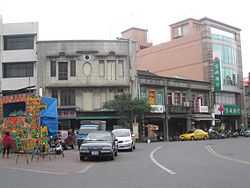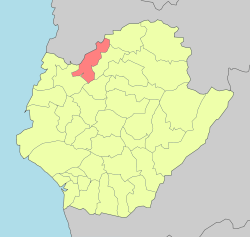Yanshui District
Coordinates: 23°18′19″N 120°14′35″E / 23.305159°N 120.243143°E
| Yanshui District 鹽水區 | |
|---|---|
 | |
 Yanshui District in Tainan City | |
| Country | Republic of China (Taiwan) |
| Special municipality | Tainan |
| Area | |
| • Total | 52.25 km2 (20.17 sq mi) |
| Population (December 2014) | |
| • Total | 26,322 |
| Website | http://web2.tainan.gov.tw/Yanshuei/ |
Yanshui District (Chinese: 鹽水區; pinyin: Yánshuǐ Qū; Pe̍h-ōe-jī: Kiâm-chúi-khu; literally: "salt-water town") is a district in Tainan, Taiwan, which is famous for its notoriously dangerous fireworks festival. The annual event commemorates a cholera epidemic more than a century ago, the fireworks symbolizing the exorcism of demons associated with the plague. The festival, known as Feng Pao, is celebrated on the 15th day after the beginning of the Lunar New Year, also called Shang Yuan Festival.
History
In 1901 during Japanese rule, Ensuikō Chō (鹽水港廳) was one of twenty local administrative offices established. In 1909, this unit was divided among Kagi Chō (嘉義廳) and Tainan Chō (臺南廳). In 1920, after reorganization, Ensui Town (塩水街) was placed under Shin'ei District (新営郡) of Tainan Prefecture.
Administrative divisions
Shuixiu Village, Fude Village, Sansheng Village, Wumiao Village, Zhongjing Village, Shuixian Village, Shuizheng Village, Qiaonan Village, Jiuying Village, Jingshui Village, Annei Village, Yichou Village, Xiazhong Village, Huanya Village, Dazhuang Village, Tongliao Village, Houzhai Village, Xuncuo Village, Zhupu Village, Xialin Village, Tianliao Village, Dafeng Village, Fandian Village, Henan Village, Nangang Village.[1]
Festival
It is said that the Fireworks Festival originated from a cholera epidemic which broke out in the early ruling period of Kuanghsu Emperor of Ching Dynasty (around 1875) and lasted for more than twenty years.
In order to drive out the evil spirits and ward off the disease, the survivors invited the spirit of Kuan Kung (Kuan Ti), the Chinese god of war. Kuan Kung is worshipped as the God of War; since he was adept at managing finances, he is also worshipped as the patron saint of businessmen.
The deities of Heaven are able to inspect the land on the day of Lantern Festival by carrying the statue of Kuan Kung in palanquins and paraded around Yanshui and letting off masses of firecrackers, and the epidemic soon receded.
"Beehive" Firework
The most important of Yanshui's prominent fireworks are the so-called "bee hives", essentially multiple launchers of bottle rockets. These rocket forts are actually thousands of bottle rockets arranged row atop row in an iron-and-wooden framework. The setup looks like a beehive full of unleashed gunpowder. When the contraption is ignited, rockets shoot out rapidly in all directions. Dazzling explosives whiz and whirl across the sky and often into the crowd itself, both thrilling and intimidating the spectators.[2]
Danger
Spectators have been wounded by rocketing fireworks while standing too close to the erupting hive. However, the festival is still held, despite moves to ban it.
Protection
To protect against injury, heavy clothing, a helmet with a full visor, and protective gloves are recommended for all spectators. A towel is also advised to be worn around the neck because many can temporarily lose their hearing if a stray rocket goes inside their helmet.
History
Yanshui used to be one of the five most important maritime towns in Taiwan, but it has declined since the harbor was closed in 1900. These days it is best known for the fireworks festival held 15 days after Lunar New Year.
Presently, there are no rail links to Yanshui. In the past, however, the Taiwan Sugar Corporation operated passenger services in Yanshui station, which have been preserved.
Geography
- Area: 52.25 km²
- Population: 26,394 people (2014)
Tourist attractions
Education
Transportation
Yanshui is easy to reach by National Highway No.1, which passes through this town and Sinying. And, Yanshui which is by Provincial Highway No.9.
See also
| Wikimedia Commons has media related to Yanshuei District. |
References
External links
- Yanshui District (Chinese)
| ||||||||||||||||||






_The_Earthern_Pig.png)
.svg.png)